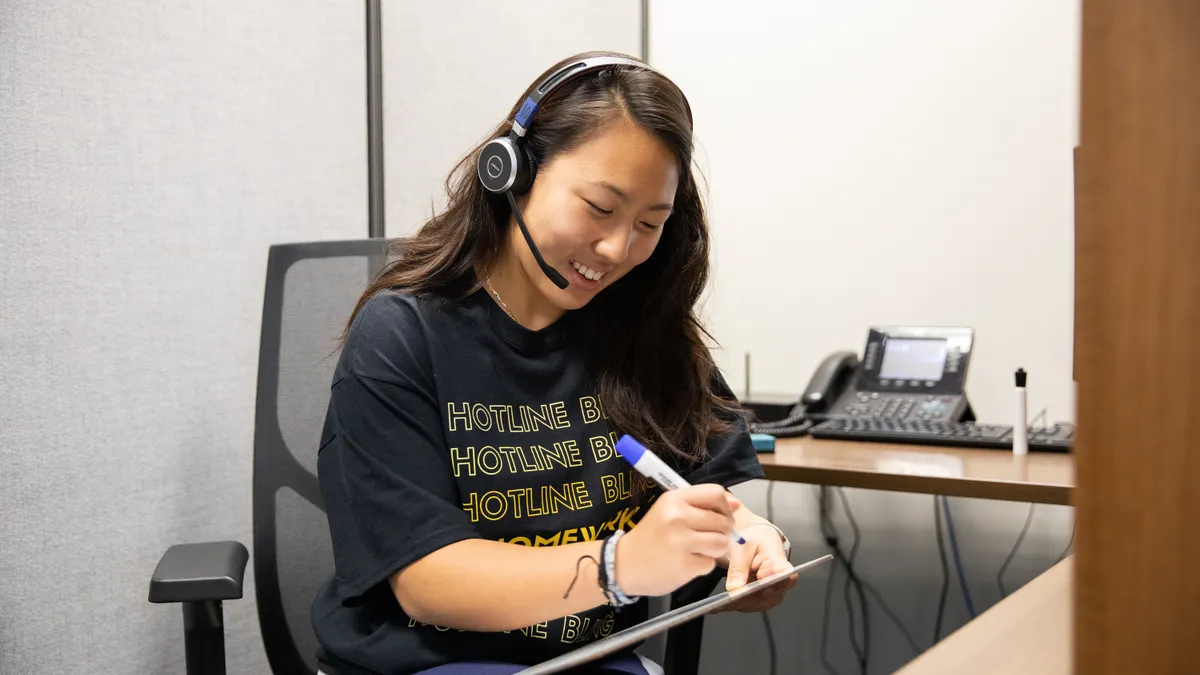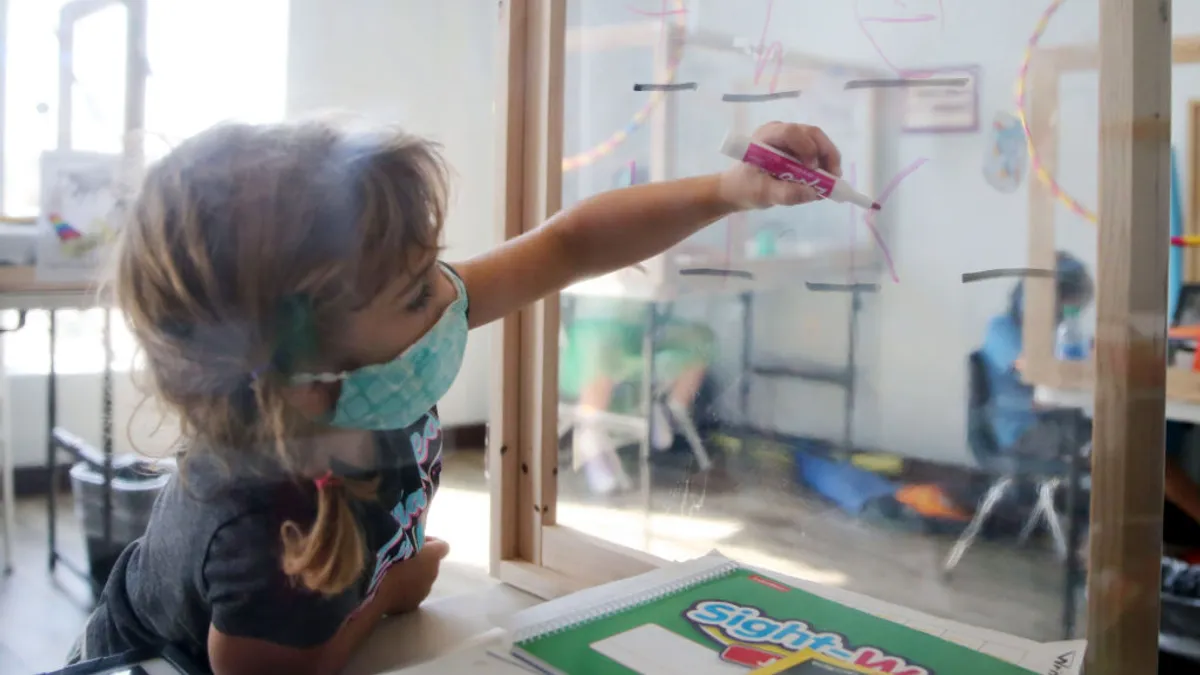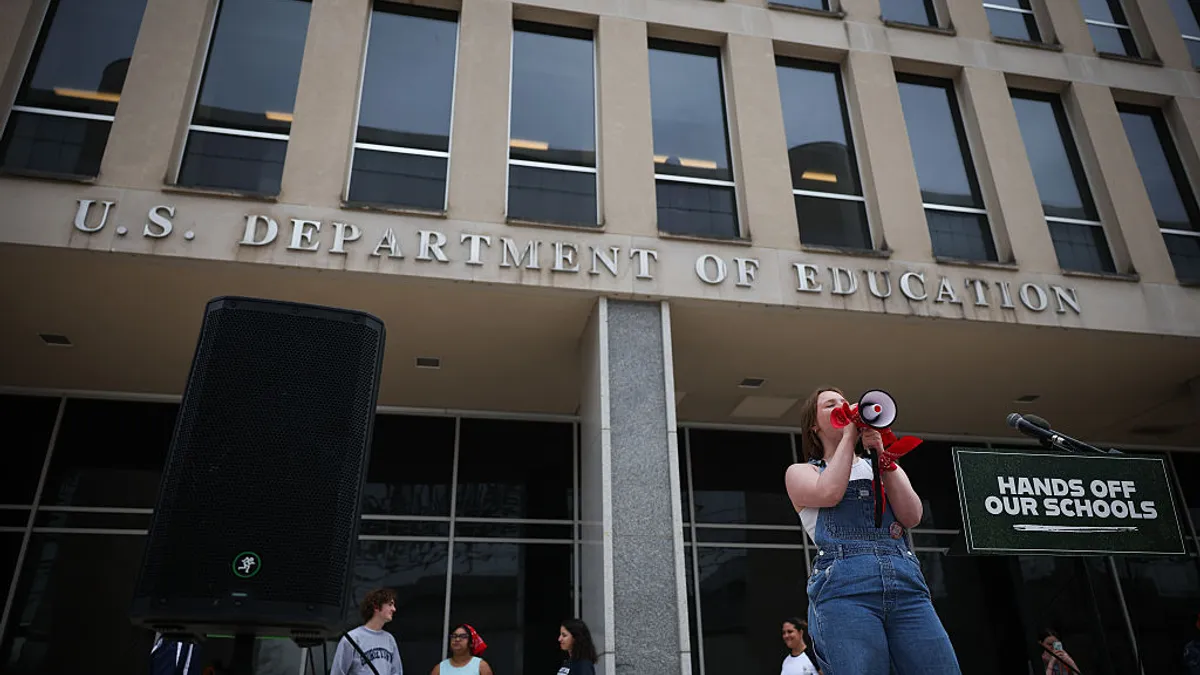Even college students don't have all the answers to high school math problems.
"Oh yeah, all the time. All the time," said Diana Lin, a senior at Harvey Mudd College in Claremont, California, of how often she is stumped when assisting high schoolers with challenging math or science homework.
Lin is a tutor with the college's Homework Hotline — a free, phone-based call center that aims to guide K-12 students through methods and formulas so the callers can determine the correct answers on their own.
The college student-run resource saw an uptick in demand during the pandemic, and even though nearly all K-12 schools are now back to full-time, in-person learning, the calls to the hotline keep coming, said Gabriela Gamiz, founding Homework Hotline staff member and the college's director of community engagement.
The Harvey Mudd Homework Hotline is just one of a handful of college-based free homework help services across the country. Rose Hulman Institute of Technology in Terre Haute, Indiana, for instance, runs an "AskRose" homework helpline. Texas A&M University in College Station hosts the on-demand "Aggie Homework Helpline" for Texas families with pre-K-12 students needing homework help, review for an upcoming test or even practice with reading skills.
"I would just patiently walk through it, give examples, make sure that they understand the concept and can work through their homework problems on their own."

Diana Lin
A Harvey Mudd College senior and tutor at the Homework Hotline
While many of these college-run homework assistance programs got started before the pandemic, there's a renewed focus on the various resources available to elementary, middle and high school students as they recover from pandemic-related academic setbacks or even seek to accelerate their learning.
School systems are using American Rescue Plan funding to create or expand programs to address learning loss, including tutoring activities. An analysis by FutureEd at Georgetown University, using data collected by Burbio from 4,155 districts and charter schools, shows 1,131 school systems are investing ARP money in tutoring initiatives.
There are a variety of tutoring models school systems are turning to, according to Matthew Kraft, an associate professor of education and economics at Brown University. They include districts creating their own programs, contracting with tutoring organizations for specific services, and using a service available to students 24/7, Kraft told K-12 Dive in February.
From frustration to understanding
The Homework Hotline at Harvey Mudd College, a private college known for its science and engineering programs, took its first call in 2010. The tutors at the time had expected the inaugural call to be about algebra or even calculus, Gamiz said.
The caller, however, was desperate for help with AP statistics. "I've never seen someone move so quickly to find an AP statistics book," Gamiz said of the tutor who took the call.
The hotline is open Monday-Thursday, 6-9 p.m. PT, and a typical evening has about eight to nine tutors on duty. Tutoring can be conducted in English as well as in Mandarin, Spanish and Tagalog depending on the tutoring staff at work each night.
Tutors at the hotline average 3,000 calls per academic year and most calls come from middle and high school students looking for help with trigonometry, geometry or algebra. But tutors also receive calls from younger students grappling with division, graphing, pre-algebra equations and other topics.
"I would just patiently walk through it, give examples, make sure that they understand the concept and can work through their homework problems on their own," said Lin, who will graduate this spring with a degree in engineering.
When a caller poses a difficult math question that Lin doesn't immediately remember how to solve, she'll Google to jog her memory or ask another tutor at the call center to assist.
The call center is also stocked with science and math textbooks and curriculum materials from nearby school districts, Gamiz said.
Alex Bishka, a Harvey Mudd senior, is another tutor at the Homework Hotline. His favorite call took place a few years ago when a frustrated student needed help with an algebra problem. Bishka's first attempts to explain variables did not make sense to the caller, but after rearranging the equation and explaining the information for the third time, the student finally understood.
"They kind of seemed to be really happy, and I think by the end of the call, they were just over the moon and being able to finally solve their homework assignment and actually understand what they're doing in class," said Bishka, who will graduate this spring with a computer science degree.
Partnering with school districts
One big challenge for both tutors and callers is trying to explain math problems and solutions over a phone line. Callers can share the math or science problem with a tutor through a Dropbox link if needed.
But the inability to see the exact assignment that has a caller perplexed has helped Lin become a better communicator. "Being able to practice that [communication] skill and be able to understand how the other person on the line is grasping a problem, that's really helpful for me," Lin said. "I'm sure I'll be using those skills in the future as I'm working with people."
Explaining foundational math concepts to students and their families also strengthens Lin's knowledge in her advanced-level course work, she said.
Tutors go through a training program that includes instruction on working with minors and using supportive language when guiding callers through equations. Tutors are paid $16 to $17 per hour and have flexibility to set their own schedule.
The hotline's annual budget is $50,000 to $60,000, paid for by the college, Gamiz said.
The Homework Hotline has agreements with four local school districts to conduct outreach, such as booths at back-to-school nights and football games, to let students' families know this resource is available.
Anthony Quan, STEM coordinator at the Los Angeles County Office of Education, has shared information about the program with district teachers. "Homework Hotline is a great resource that connects community to schools, college to kids and imagination to inspiration," Quan said in a statement.
Those school-college partnerships are important in helping both better understand how to work together to increase support for K-12 students, Gamiz said.
"It is also very important for the growth of our program — that we really believe in — is how do we hear back from our community and what they need," said Gamiz, who added that no caller is ever turned away.




















